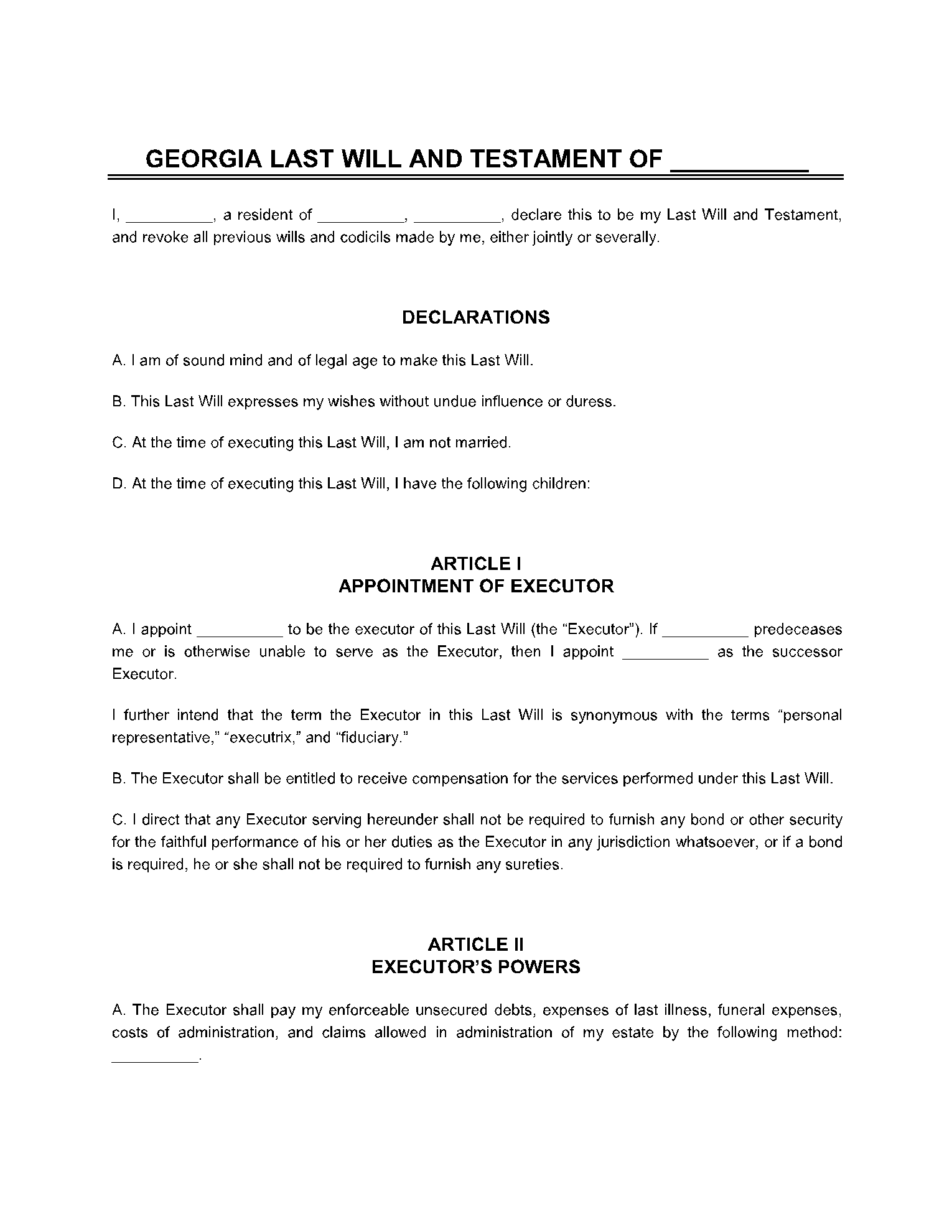Making a last will and testament in Georgia is critical for determining how your real estate, personal property, and cash will be distributed after your death. After death, in Georgia will form allow the testator (the person who writes the will) to take care of a spouse, children, other loved ones, and even pets. You may also use your Georgia will to leave the property or make additional donations to charitable organizations.
Any time before the testator's death, a new will or a codicil, an expansion or amendment that must be performed with the same formalities as a will to be binding, may be attached to a Georgia last will and testament.
What Does Georgia Last Will and Testament Mean?
The Last Will and Testament in Georgia is a legal document that specifies how a person's assets will be distributed to his or her heirs after death. Testators use a Georgia will sample to protect their possessions and property from unwelcome visitors after they die.
Testators often leave their assets to their children, parents, and siblings in their Last Will and Testaments in Georgia; however, it is not unusual for Testators to leave assets to charity and other non-profit organizations. In Georgia, this declaration must be signed by two witnesses and a notary public.
Why Do You Need Last Will and Testament in Georgia?
Even though the last will and testament in Georgia are not constitutionally necessary, state laws determine how an estate's assets are distributed. However, the result under these laws may not be in accordance with the decedent's desires, so a final will and testament are usually recommended.
One of the essential advantages of making a final will and testament is that it helps the testator appoint the executor or personal representative of the estate. This person will be in charge of carrying out the wishes expressed in the will; if there is no Georgia will, the courts will decide for you.
A Georgia will be used for various reasons. The most important is to specify how properties such as real estate, cars, jewelry, business interests, bank accounts, and cash should be divided after the testator's death. In the last will and testament template in Georgia, it can also appoint someone as the children's legal guardian.
What Are the Requirements for a Legitimate Will in Georgia?
How to write a Georgia will is a common legal concern for responsible adults. Surprisingly, you can write your last will and testament in Georgia, when you're only 14 years old. Unfortunately, because it is "self-proving," it can be treated as though you have no Georgia will at all. You'll need another legal document signed by the testator's two witnesses and a notary public if you want your will to be self-proving.
Some items must be included in your Georgia will form for it to be valid.
- Personal information typed or neatly written at the end, including legal name, area, and county of residence.
- The chosen executor's and an alternate's name, city, county, and state of residence.
- Every beneficiary's full legal name, address, last four digits of their social security number, and relationship, as well as the property bequeathed to them.
- Two or more witnesses' names, signatures, and addresses are printed on will template in Georgia to make it "self-proving."
- Notarization is another alternative.
Getting a Georgia estate planning attorney support is the safest course of action to ensure your wishes are fulfilled completely and accurately. They might suggest ideas for your Georgia will sample that you hadn't considered, and they will make sure it contains all of the requisite elements.
Conclusion
If you die without a Georgia will, your assets will be divided according to the state's "intestacy" rules. The intestacy law in Georgia distributes your assets to your closest relatives, starting with your spouse and children. If you don't have a spouse or children, your property will be passed down to your grandchildren or parents.
Siblings, grandparents, aunts and uncles, cousins, nephews, and nieces are among the increasingly distant relatives on this list. If the court determines that you have no living relatives by blood or marriage after exhausting this list, the state will claim your house.
